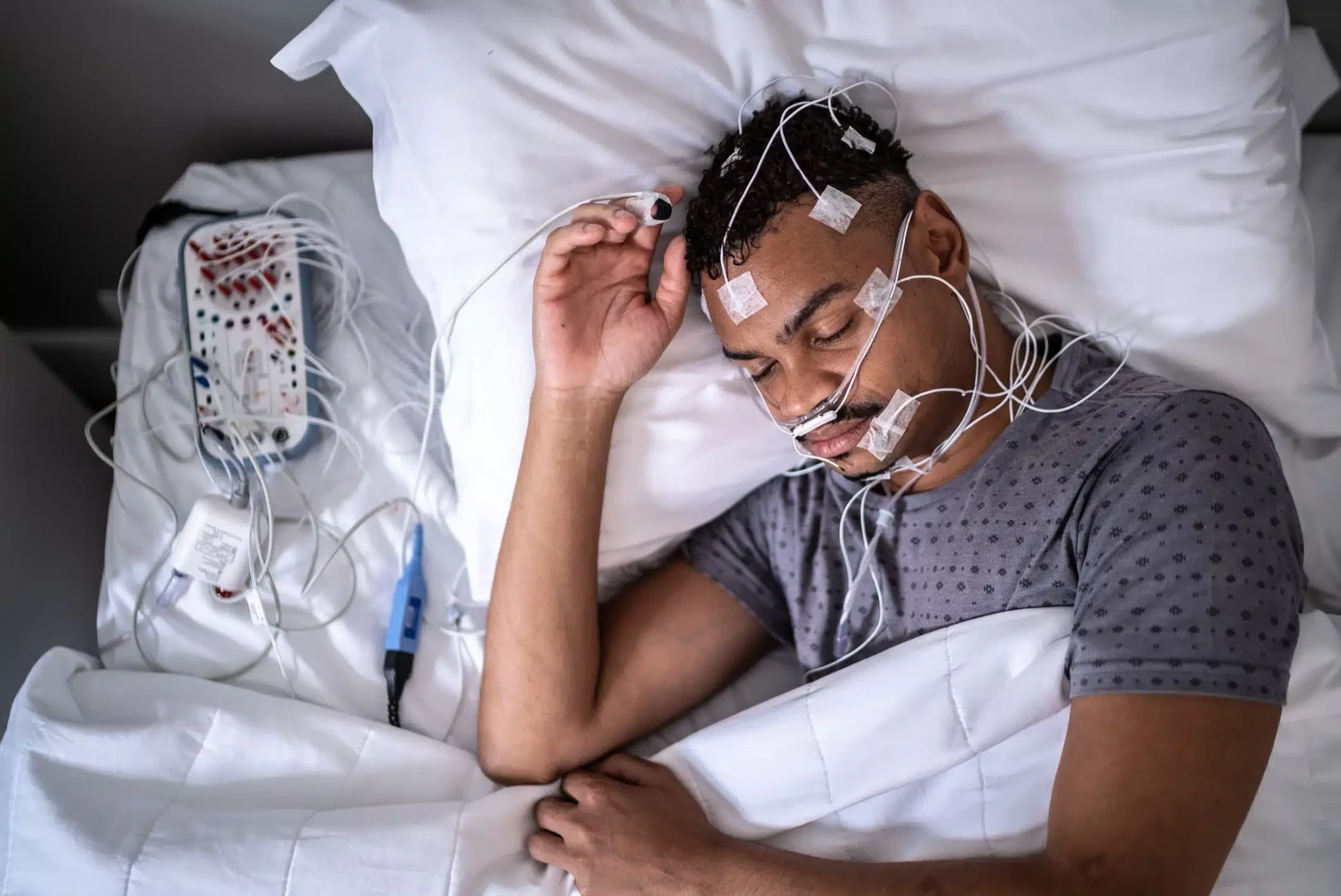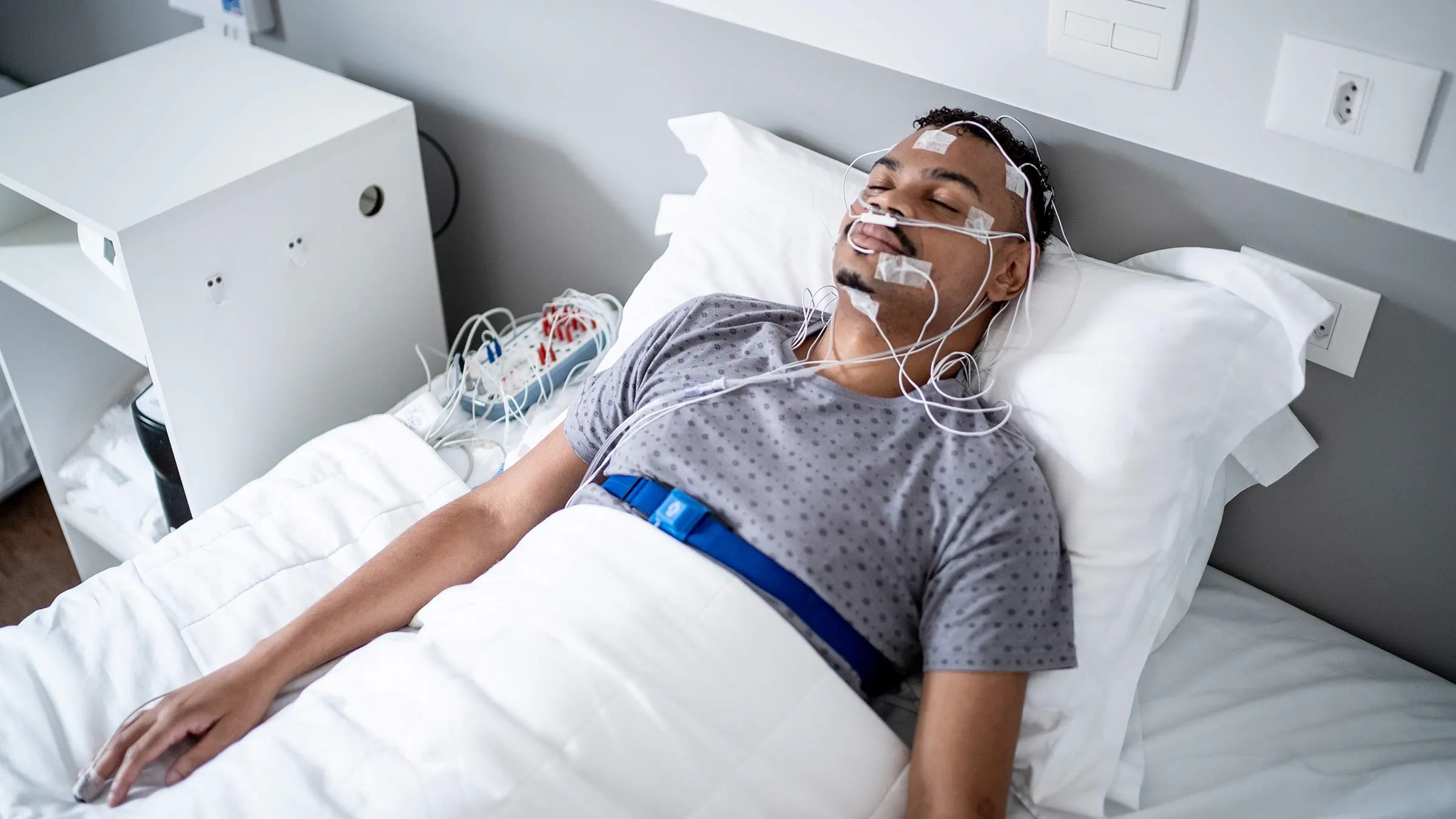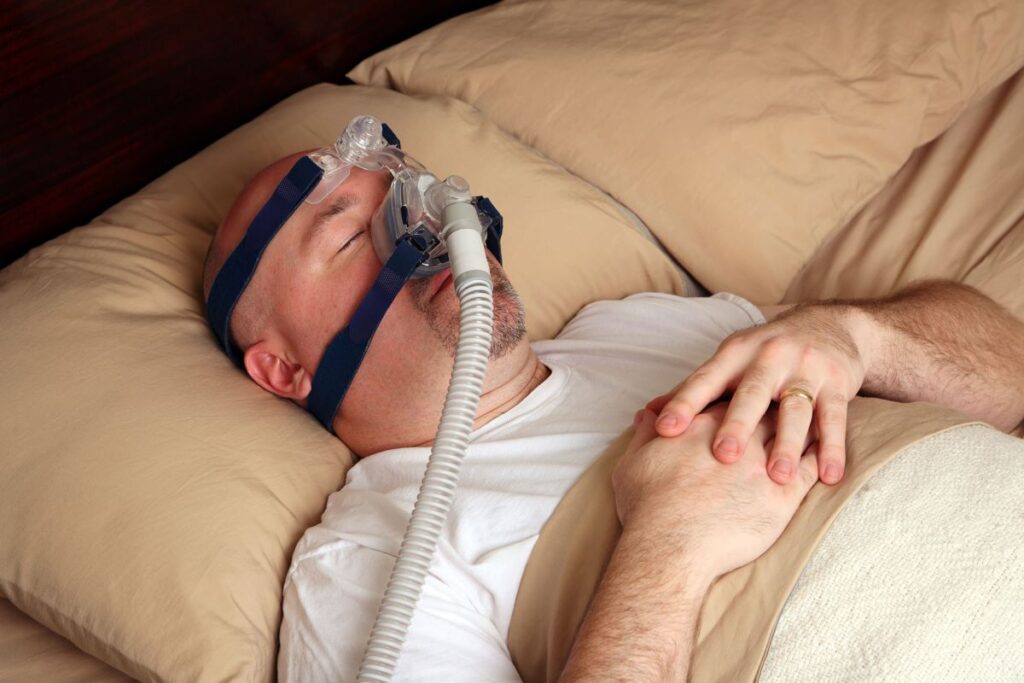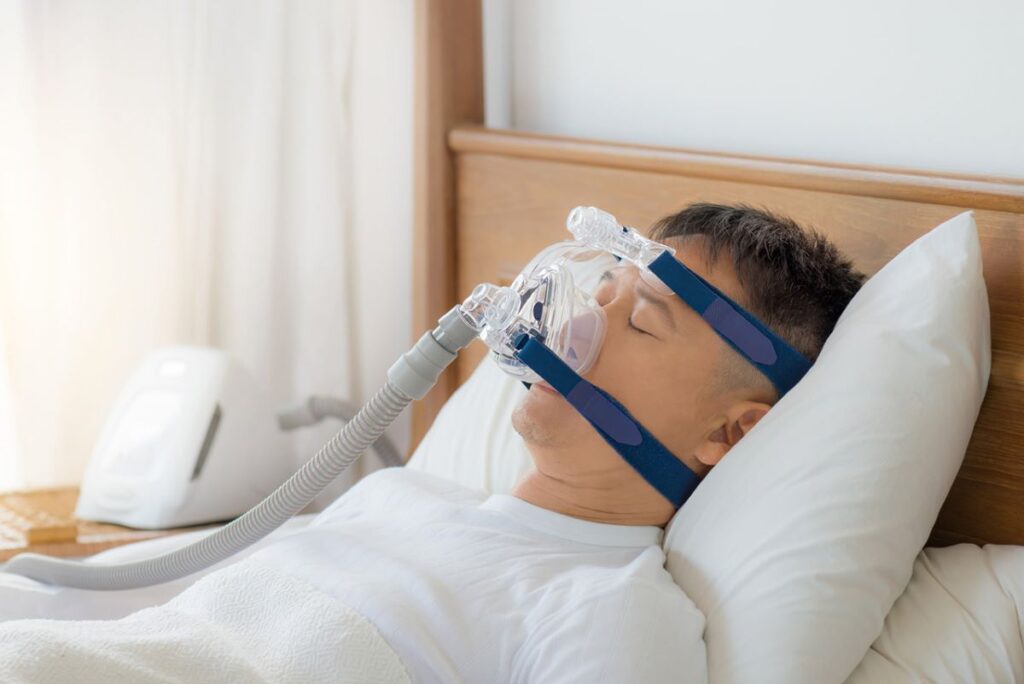What Is Sleep Apnea and How Does It Affect Health?
Sleep apnea is a serious sleep disorder where your breathing repeatedly stops and starts throughout the night. Obstructive sleep apnea, the most common form, occurs when throat muscles relax excessively during sleep, causing the soft tissue to collapse and block your airway. This airway obstruction forces your brain to wake you briefly to restore normal breathing, creating a cycle that can repeat hundreds of times per night.
The obstructive sleep apnea symptoms extend far beyond simple snoring. You may experience:
- Chronic fatigue despite spending adequate time in bed
- Morning headaches and dry mouth
- Difficulty concentrating during daytime activities
- Irritability and mood changes
- Frequent night-time urination
Fragmented sleep from these breathing interruptions prevents you from reaching the deep, restorative sleep stages your body requires. This disruption creates a cascade of health risks that affect multiple body systems.
Effects on Cardiovascular Health
Your cardiovascular system bears significant strain from sleep apnea. The repeated drops in blood oxygen levels force your heart to work harder, increasing your risk of high blood pressure, heart disease, and stroke. The condition also contributes to insulin resistance, potentially leading to type 2 diabetes.
Impact on Daytime Functioning
Daytime impairment becomes particularly dangerous when it affects your ability to drive safely or perform work tasks requiring concentration. Many people don’t realise their persistent tiredness stems from undiagnosed sleep apnea rather than simply poor sleep habits.
Why Is Early Diagnosis of Sleep Apnea Important?
Early diagnosis benefits extend far beyond simply identifying a sleep disorder. When you catch sleep apnea in its initial stages, you prevent a cascade of serious health complications that can develop over time. Untreated sleep apnea increases your risk of heart disease, stroke, diabetes, and high blood pressure – conditions that become increasingly difficult to manage as they progress.
The Role of Sleep Studies in Diagnosis
A comprehensive Sleep Apnea Test Canberra serves as the cornerstone of accurate diagnosis, providing detailed insights into your breathing patterns, oxygen levels, and sleep architecture. These diagnostic assessments capture critical data that clinical observations alone cannot detect, enabling healthcare professionals to determine the severity of your condition and develop targeted treatment strategies.
Immediate Benefits of Proper Diagnosis
The impact on your daily life becomes immediately apparent once proper diagnosis occurs. You’ll experience:
- Enhanced cognitive function – improved memory, concentration, and decision-making abilities
- Increased energy levels – reduced daytime fatigue and better productivity
- Mood stabilisation – decreased irritability and reduced risk of depression
- Better relationships – improved sleep quality for both you and your partner
Long-Term Advantages of Early Intervention
Quality of life improvement represents one of the most significant advantages of early intervention. When you address sleep apnea promptly, you maintain your cardiovascular health, preserve cognitive function, and avoid the progressive deterioration that characterises untreated cases. Your body’s natural healing processes work more effectively when you receive consistent, restorative sleep each night.
How Is Sleep Apnea Diagnosed in Canberra?
Air Liquide Healthcare sleep solutions have transformed the way sleep apnea is diagnosed in Canberra with their extensive home-based sleep studies Canberra program. This innovative approach allows you to undergo sleep testing in the comfort of your own bedroom, using advanced and non-invasive monitoring equipment that records your breathing patterns, oxygen levels, and sleep quality throughout the night.
How Does the Diagnostic Process Work?
The diagnostic process begins when you receive a compact monitoring device that you simply wear while sleeping at home. This device captures essential data including:
- Airflow measurements through nasal sensors
- Blood oxygen saturation levels
- Chest and abdominal movement patterns
- Heart rate variations during sleep
- Body position changes
Who Interprets the Test Results?
Air Liquide Healthcare’s integrative approach ensures your test results are validated by qualified Sleep Physicians who work closely with local healthcare providers across Canberra. This collaboration guarantees accurate interpretation of your sleep study data and appropriate treatment recommendations tailored to your specific condition.
Understanding Sleep Apnea
It’s important to note that sleep apnea is not just a simple snoring issue; it is a serious health condition characterized by repeated interruptions in breathing during sleep. These interruptions can lead to a host of health issues if left untreated, making timely diagnosis and intervention crucial.
Is Sleep Apnea Diagnosis Covered by Insurance?
Medicare coverage for sleep tests makes diagnosis accessible for eligible patients, with diagnostic tests meeting MBS guidelines receiving rebates. Private health insurance may provide additional coverage depending on your policy specifics. The streamlined process eliminates lengthy waiting lists typically associated with hospital-based sleep laboratories while maintaining clinical accuracy standards.
When Can I Expect My Test Results?
You’ll receive comprehensive results analysis within days of completing your home study, allowing for prompt treatment initiation when sleep apnea is detected.
What Treatment Options Are Available for Sleep Apnea Patients in Canberra?
CPAP therapy Canberra services provide the primary treatment pathway for most sleep apnea patients. Air Liquide Healthcare facilitates comprehensive CPAP therapy initiation programmes through strategic partnerships with leading CPAP manufacturers. These programmes include:
- Titration support to determine optimal pressure settings
- Equipment selection tailored to individual patient needs
- Initial setup assistance ensuring proper mask fitting and device operation
- Ongoing monitoring to track therapy effectiveness
The therapy works by delivering continuous positive airway pressure, preventing airway collapse during sleep cycles.
Complementary Lifestyle Modifications
Lifestyle changes OSA treatment approaches enhance CPAP therapy effectiveness. Evidence-based modifications include:
- Weight reduction – even modest weight loss can significantly reduce apnea severity
- Alcohol limitation – particularly avoiding consumption within 4-6 hours of bedtime
- Sleep position training – encouraging side sleeping over back sleeping
- Smoking cessation – reducing airway inflammation and swelling
Alternative Treatment Approaches
Dental devices for sleep apnea offer viable alternatives for patients with mild to moderate OSA or those unable to tolerate CPAP therapy. These custom-fitted oral appliances reposition the jaw and tongue to maintain airway patency.
Surgical interventions remain available for specific cases where anatomical abnormalities contribute significantly to airway obstruction. Sleep physicians evaluate each patient’s suitability for these procedures based on individual anatomical factors and OSA severity.
Treatment selection depends on apnea severity, patient preferences, and medical history, with sleep specialists guiding optimal therapy choices.
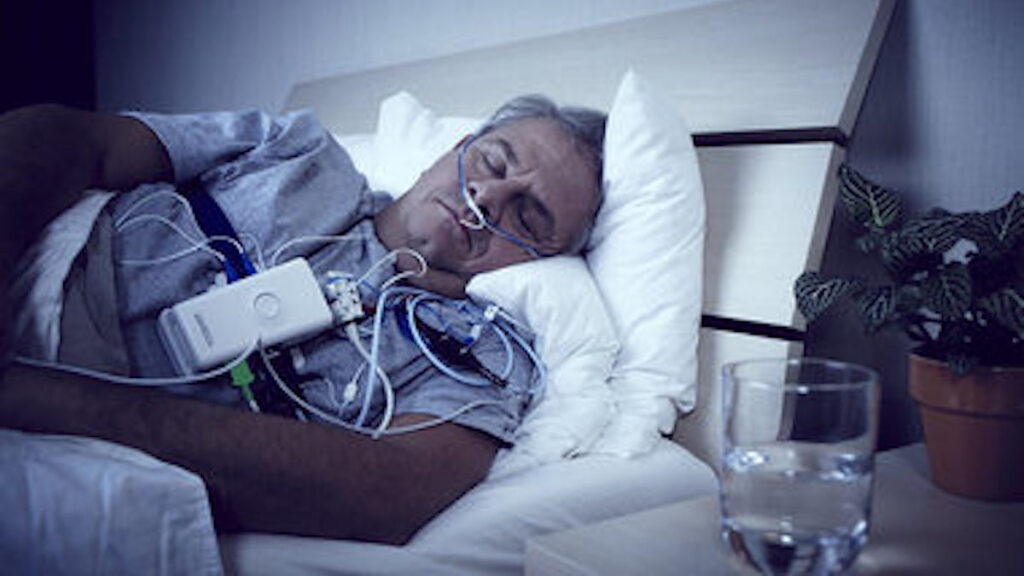
How Does CPAP Therapy Work and What Support Is Offered?
CPAP therapy benefits stem from its fundamental mechanism of delivering continuous positive airway pressure through a mask worn during sleep. The device generates a steady stream of pressurised air that acts as a pneumatic splint, preventing the soft tissues in your throat from collapsing and blocking your airway. This constant air pressure maintains an open breathing passage throughout the night, eliminating the breathing interruptions characteristic of sleep apnoea.
The pressurised air flow creates a gentle but effective barrier against airway obstruction, allowing you to breathe naturally without the repeated wake-sleep cycles that fragment your rest. Modern CPAP machines automatically adjust pressure levels based on your breathing patterns, ensuring optimal treatment whilst maximising comfort. For more insight into how these auto-adjusting CPAP machines work and how they can solve common CPAP issues, you can refer to this detailed guide.
What Support Is Offered for CPAP Therapy?
Therapy guidance support Canberra patients receive extends far beyond the initial equipment setup. Air Liquide Healthcare’s comprehensive support programmes include:
- Initial titration programmes that determine your optimal pressure settings through careful monitoring
- 24/7 technical support for troubleshooting equipment issues
- Regular compliance monitoring to track your therapy effectiveness
- Mask fitting consultations to ensure proper seal and comfort
- Equipment maintenance guidance to extend device lifespan
Sleep specialists work closely with patients during the critical first months of therapy, addressing common challenges such as mask discomfort, air pressure adjustment, and developing consistent usage habits. This ongoing support significantly improves treatment compliance rates, with many patients experiencing dramatic improvements in sleep quality and daytime alertness within weeks of starting therapy.
What Are the Advantages of Home-Based Sleep Studies Compared to In-Lab Testing?
The advantages of home sleep studies for residents in Canberra come from the shift towards patient-centred care. You can have the test done in your own bedroom, which removes the stress and discomfort of sleeping in an unfamiliar clinical setting. This natural sleep environment leads to more accurate results, as you stick to your usual sleep habits and routines.
Comfort and Convenience
One of the main benefits of home sleep studies is the comfort and convenience they offer. With this type of testing, you can:
- Sleep in your own bed
- Follow your regular bedtime routine
- Avoid the anxiety of sleeping in a strange place
These factors contribute to a more natural sleep experience, which can result in more reliable data.
Non-Invasive Testing
Home-based studies also have non-invasive testing benefits that go beyond comfort. Unlike traditional sleep laboratories that use multiple wires and sensors, home sleep studies require minimal equipment. Typically, you’ll only need a small recording device that tracks your breathing patterns, oxygen levels, and sleep position. This allows for greater freedom of movement during sleep, making it easier to replicate your normal sleeping habits.
Validated Accuracy
Sleep Physicians confirm the accuracy of home studies through Air Liquide Healthcare’s integrative approach. This validation process ensures reliable diagnoses while still prioritising convenience. The technology used in these studies captures key data points necessary for an accurate diagnosis of sleep apnea, which are then reviewed by qualified specialists.
Cost-Effectiveness
Another significant advantage for patients in Canberra is cost-effectiveness. Home sleep studies are eligible for Medicare rebates when they meet MBS guidelines, which means lower out-of-pocket expenses for you. Additionally, since there are no overnight facility costs involved, testing becomes more accessible to a wider range of patients.
Reduced Waiting Times
Compared to in-lab facilities, home sleep studies often have shorter waiting times. This means you can get tested and receive results more quickly.
Multiple Night Testing Options
If initial results from a home sleep study are inconclusive, there may be opportunities for multiple night testing. This flexibility allows for a more comprehensive assessment of your sleep patterns.
Immediate Equipment Return
With convenient collection services available, you can return the equipment used for your home sleep study immediately after completing the test. This streamlined process helps ensure timely analysis and reporting of results.
See Also : Home Sleep Testing in Australia: A Convenient Alternative to Clinics
How Can Patients Access Sleep Apnea Services in Canberra?
Air Liquide Healthcare is Australia’s largest provider of home sleep apnea studies, offering comprehensive Sleep Apnea Test Canberra: Early Diagnosis and Treatment Options through their extensive network. You can access their services through several established brands operating across the region:
- SNORE Australia – Specialising in sleep disorder diagnosis and treatment
- Healthy Sleep Solutions – Comprehensive sleep health management
- Mycroft – Advanced sleep study services
- Complete Care – End-to-end patient support
- Sleep Disorder Australia (SDCA) – Specialist sleep medicine services
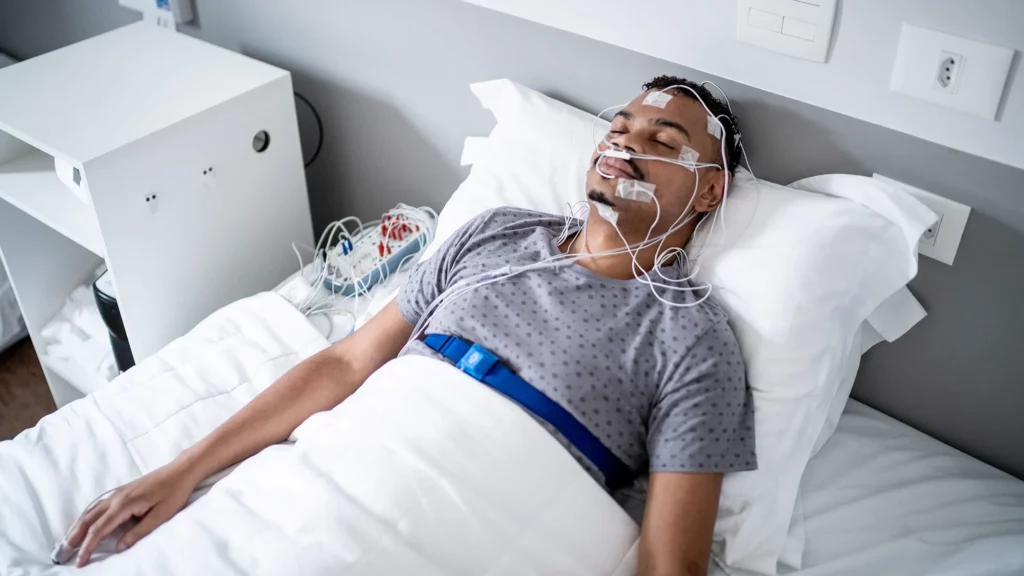
Getting Started with Testing
You have two main options for accessing sleep apnea test Canberra services:
- GP Referral Route: Your general practitioner can refer you directly to these local providers of OSA management services. This pathway often ensures Medicare coverage eligibility and streamlined coordination with your existing healthcare team.
- Direct Contact: You can contact service providers directly to discuss your symptoms and testing requirements. Many providers offer initial consultations to determine the most appropriate testing approach for your situation.
The testing process usually begins with a thorough assessment of your symptoms and medical history. Sleep specialists then work with your chosen provider to arrange delivery of home-based testing equipment and provide setup instructions. You’ll receive detailed guidance on how to use the monitoring devices and schedule follow-up appointments for interpreting results and planning treatment.
These established networks ensure you receive validated, physician-supervised care throughout your sleep apnea journey.

